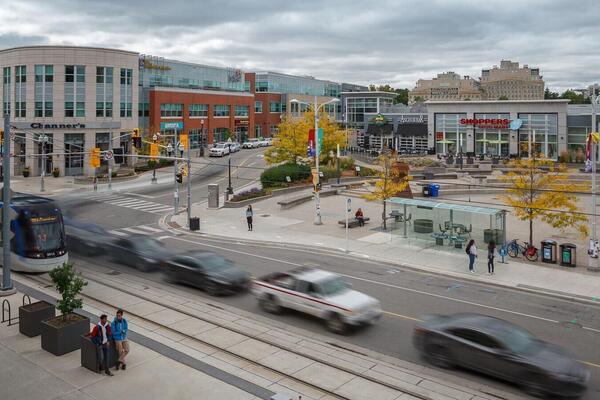
From a hashtag to real social impact
Dr. Naila Keleta-Mae champions #BlackAndFree project with private and public sector partnerships to support Black artists

Dr. Naila Keleta-Mae champions #BlackAndFree project with private and public sector partnerships to support Black artists
By Darren McAlmont University RelationsFor many Black folks living in North America, there is something paradoxical about the notion of being Black and free, yet Dr. Naila Keleta-Mae has been championing this idea since 2002, with the release of her album “Free Dome.” In 2017, she was one of the first to use the hashtag (#BlackAndFree) and has turned it into a positive social movement and research-creation project, funded by multiple grant-funding organizations.
 “In 2017, I was thinking about people I knew … and what it meant to be, and would mean to be Black and free. I started using the hashtag on Twitter and by the fall, I said that I wanted to spend the rest of my life and career focused on Blackness and freedom. And so that was my declaration and promise to myself,” she says.
“In 2017, I was thinking about people I knew … and what it meant to be, and would mean to be Black and free. I started using the hashtag on Twitter and by the fall, I said that I wanted to spend the rest of my life and career focused on Blackness and freedom. And so that was my declaration and promise to myself,” she says.
Today, Black And Free has partnerships with private and public sector organizations and works with multiple demographics, including children, teenagers, undergraduate and graduate students to commission, teach and produce art in various forms.
Publishing books, providing $3,000 commissions to emerging and established Black artists and engaging Black playwrights to propose plays for children on the topic of Blackness and freedom, are just some of the things that come from the Black And Free project.
Keleta-Mae wears many professional hats. She is an associate professor in the Department of Communication Arts at the University of Waterloo, a Dorothy Killam Fellow, a Canada Research Chair in Race, Gender and Performance, a College Member of the Royal Society of Canada and a multidisciplinary artist with an existing practice.

Before the Black And Free project, her journey to academia was not linear. She started her undergraduate degree without plans for any further post-secondary training and founded a cultural production company. A few years later, she thought that it was time to punctuate and end her formal education with a Master of Fine Arts degree, which she completed at York University.
But after another stint in the field as an artist and freelance educator, Keleta-Mae once again followed a calling back to higher education to complete a PhD because she was interested in bringing the knowledge gained from navigating the non-profit and government sector to her teaching in university spaces.
Now, Keleta-Mae teaches courses on gender and performance, political performance and race and performance. Her research and artistic contributions have particularly focused on two related fields: Black expressive culture and Black feminism, which led to a Waterloo Arts award for excellence in research in 2022.
Simultaneously, her activism that centres Black experiences through poetry and music often receive recognition beyond academic spaces. In 2016, she penned an op-ed for the Globe and Mail on the reasons why Black Lives Matter is (and must) be dramatic, unsettling and inconvenient. The article broke the record for the most shares on Facebook in the opinion section’s history.
Even with her many accomplishments and accolades, Keleta-Mae is most proud for having never given up on herself. “Despite the valleys that are numerous, and deeper sometimes than I even knew it was possible for a valley to be, I have never given up,” she says.
“So my proudest achievement that I can say with confidence — as demonstrated by decades of life — is that I am doing and being who and what I imagined, and having impact in the sectors in ways that I thought that I should be able to have impact.”
To learn more about how you can connect and support the Black And Free project, follow their Instagram and Facebook page.
The University of Waterloo will co-host the 2024 Scarborough Charter Inter-Institutional Forum on May 9 and 10 in partnership with Wilfrid Laurier University. This national symposium brings together senior administration, faculty, staff, students and members of the Black community. The forum's theme, Bridging Black: Building Connections for Black Flourishing, aims to bridge the gaps in learning and action and build stronger connections between the different stakeholders in higher education.
Images: Banner photograph was taken in Africville, Nova Scotia, while on a research site visit for Black And Free in August 2023; Keleta-Mae's 2020 "Fire Woman" album cover photo.

Read more
Discover how Waterloo alumni are driving Canada’s economy with five tech companies making a local and global impact

Read more
It Started in Waterloo: An Astronaut's Journey into the Universe of Innovation, narrated by Chris Hadfield, highlights the University of Waterloo’s role in igniting innovation within the region and beyond.

Read more
Researchers awarded funding to investigate ecology, climate change, repatriation, health and well-being through cultural and historical lens
The University of Waterloo acknowledges that much of our work takes place on the traditional territory of the Neutral, Anishinaabeg, and Haudenosaunee peoples. Our main campus is situated on the Haldimand Tract, the land granted to the Six Nations that includes six miles on each side of the Grand River. Our active work toward reconciliation takes place across our campuses through research, learning, teaching, and community building, and is co-ordinated within the Office of Indigenous Relations.